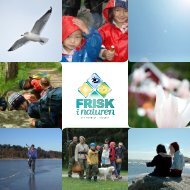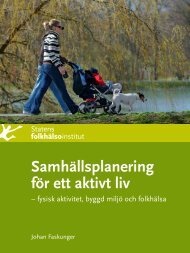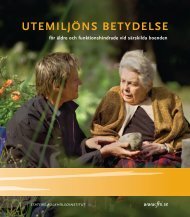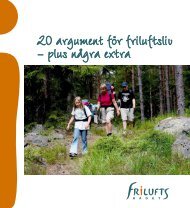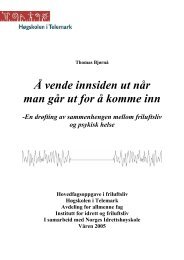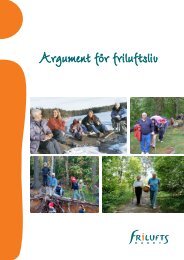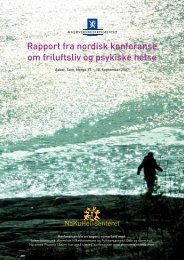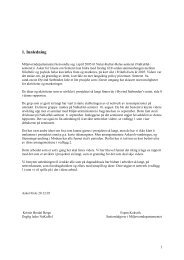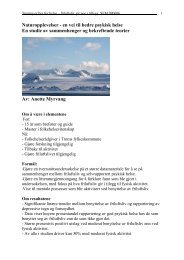Green Care: A Conceptual Framework - Frisk i naturen
Green Care: A Conceptual Framework - Frisk i naturen
Green Care: A Conceptual Framework - Frisk i naturen
You also want an ePaper? Increase the reach of your titles
YUMPU automatically turns print PDFs into web optimized ePapers that Google loves.
There is also a growing body of evidence on the positive relationship<br />
between exposure to nature (incorporating a variety of outdoor settings,<br />
from the open countryside, fields and forests, to street trees, allotments and<br />
gardens) and an individual’s mental health (see, for example, Bird, 2007;<br />
Hartig et al, 2003; Mind, 2007). The key message emerging is that contact<br />
with nature improves psychological health by reducing pre-existing stress<br />
levels, enhancing mood, offering both a ‘restorative environment’ and a<br />
protective effect from future stresses.<br />
Combining the effects of physical activity and contact with nature on<br />
psychological health, recent studies have found that ‘green exercise’ (the<br />
synergistic effect of engaging in physical activities whilst simultaneously<br />
being directly exposed to nature) results in significant improvements in<br />
self-esteem and mood measures, as well as leading to significant reductions<br />
in blood pressure (Pretty et al, 2005a & 2005b, 2007; Peacock et al, 2007;<br />
Hine et al, 2008).<br />
Recent research also suggests that therapeutic applications of facilitated<br />
green exercise activities (particularly walking) as ‘green exercise therapy’<br />
may prove to be an even more effective treatment response than exercise<br />
alone in mild to moderate depression as it encourages people to re-connect<br />
with nature and experience the additional positive health benefits that are<br />
associated with this (Peacock et al, 2007; Mind, 2007). In Australia there<br />
has also been some research initiated into the participation in forest and<br />
woodland management as a treatment for depression (Townsend, 2006).<br />
The pilot project engages people experiencing depression in naturebased<br />
activities in a woodland environment. The project is on-going but<br />
initial findings suggest encouraging improvements to physical and mental<br />
health, along with a reduction in social isolation. Using green exercise as<br />
a treatment for mild to moderate depression can be considered a form of<br />
green care.<br />
4.5 Ecotherapy<br />
Ecotherapy as an approach has been proposed as a form of practice since<br />
the mid nineties (Roszak, 1995; Clinebell, 1996; Burns, 1998). George W.<br />
Burns, an Australian clinical psychologist and hypnotherapist developed<br />
what he termed ‘ecopsychotherapy’ and ‘nature-guided therapy’. His<br />
primary thesis was that a positive relationship with the natural world is<br />
42 <strong>Green</strong> <strong>Care</strong>: A <strong>Conceptual</strong> <strong>Framework</strong>



